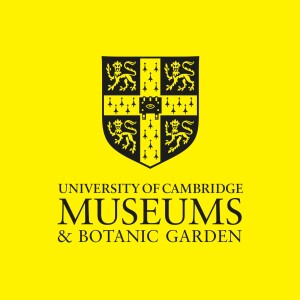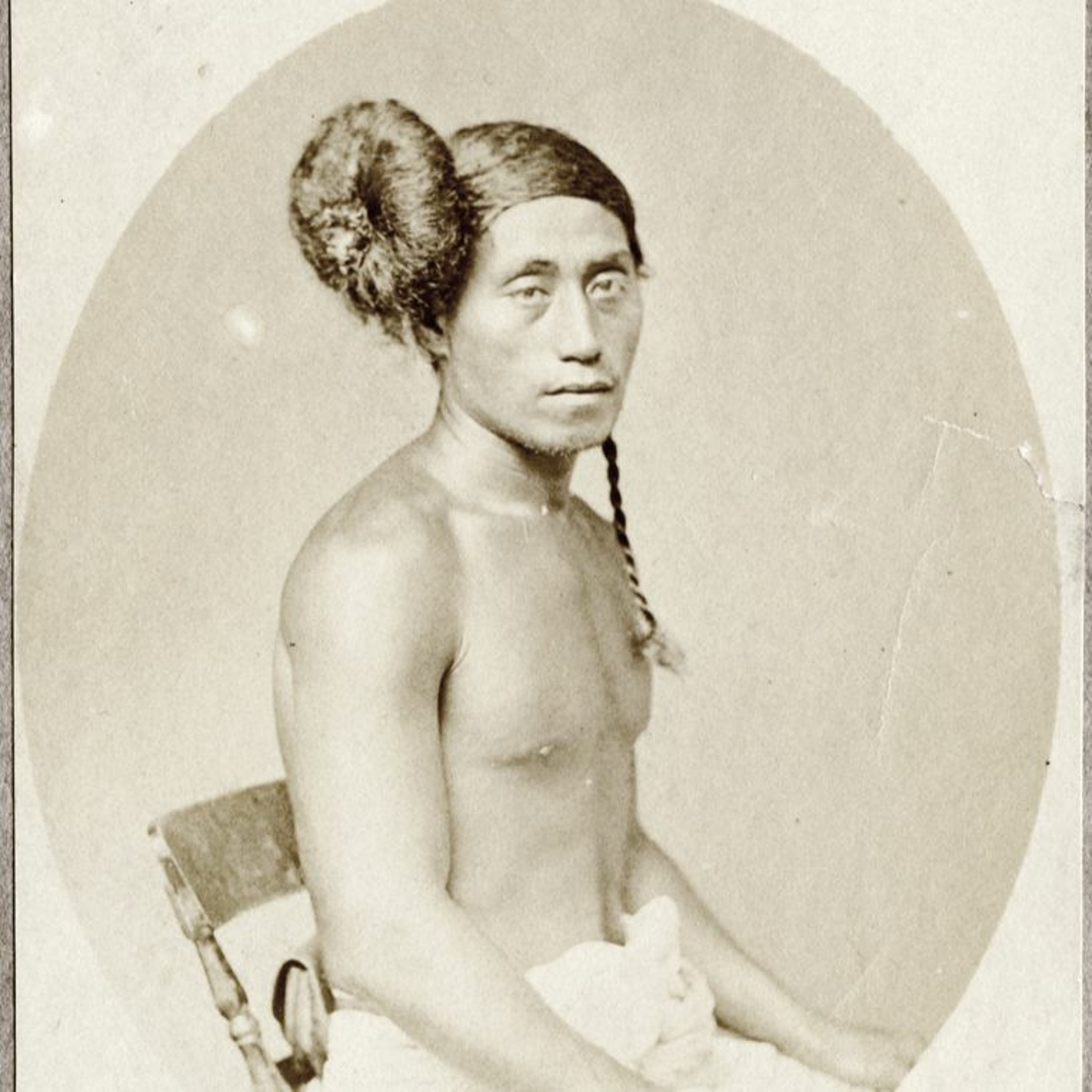
University of Cambridge Museums
Society & Culture

Tae Ateh and Izzy Collie-Cousins respond to a pair of photographs at the Museum of Archaeology and Anthropology (MAA).
The studio photographs were taken in Samoa in the 1870s. The subject is unknown: the photographer's labels say "man from Tutuila with hair bound [and] unbound".
They write,
"This is a compilation of responses to the blatant colonial perspective that governs British museums, particularly those of anthropology and ethnography. It incorporates the political struggle for repatriation, personal poetic responses, and the reflections of an inexperienced observer. Neither of us are experts, and this is part of the problem. For real change to be affected, museums will have to employ academic experts to begin rectifying institutional imbalances, not merely open the floor to the concerned public. The sensory overload of multiple overlapping voices recalls the overload of information in museums, and the struggle of any one visitor to decipher the information that confronts them. We wanted to further platform the call for the decolonisation of museums, and chose this work because it directly demonstrates the othering of indigenous people by the western spectator. We both responded independently to the work, then combined our responses with the responses of decolonial protestors and specialists. Museums should approach these objects differently by highlighting the formal characteristics and provenance of the works that demonstrate the colonial, orientalist perspective they promote. Furthermore, museums should pay close attention to the ways photographic or artistic subjects present themselves in this work. It is clearly known by MAA curators that this person is fa'afine (roughly translating to Third Gender) - therefore, titling them a 'man' is incorrect. While acknowledging that the photographer and collector did not acknowledge this person's gender presentation as being outside of the binary is important, it is also essential to accurately and respectfully present this person as they present themselves. Moreover, museums should employ non-white experts to write on and curate their collections."
Anita Herle, Senior Curator at MAA, writes,
"This pair of 1870s studio photographs of an anonymous person from Samoa were put on display at MAA earlier this year as part of the University of Cambridge Museums' Bridging Binaries tours. Our understanding that this unknown and unheard person was likely a fa'afafine was based on conversations with Samoan researchers working with the collections at MAA. The invitation to assist with untangling the complex colonial context of these images has provoked a powerful and multi-layered response calling for the decolonisation of museums. It forcefully reminds us that there is a long way to go and that we need to work together both inside and outside the Museum. MAA has been working closely with numerous descendant communities from around the world for over two decades. We need to extend this work and make it more visible to multiple museum audiences. The employment of BIPOC researchers has been crucial to our work, but unfortunately it has been limited to temporary contracts. There needs to be more opportunities for people from diverse backgrounds to have secure employment in museums and across the university. We are working with colleagues across the University and more widely across the museums sector to understand how we can address this.
The response is also a welcome reminder of the need to be careful with language when presenting historical material. While MAA's label text uses gender neutral language when describing this person, the quotation marks around the historic title have disappeared in your reading and instead the title has re-enforced the very stereotypes that the display question.
I am grateful for the heartfelt response. Your comments will inform a re-writing of this and other display labels and encourage MAA to take a stronger stance in support of decolonisation."
view more
More Episodes
Does rumour have power?
 2021-05-06
2021-05-06
 2021-05-06
2021-05-06
Caneius transforms into a hero
 2021-05-06
2021-05-06
 2021-05-06
2021-05-06
Pantomimes, petticoats and polar expeditions
 2021-05-06
2021-05-06
 2021-05-06
2021-05-06
Who loved Alexander the Great?
 2021-05-06
2021-05-06
 2021-05-06
2021-05-06
How to ensure a memory never fades
 2021-05-06
2021-05-06
 2021-05-06
2021-05-06
Gossip from Queen Anne's court
 2021-02-08
2021-02-08
 2021-02-08
2021-02-08
Phyllis Wager: A Typewriter's Tale
 2020-07-22
2020-07-22
 2020-07-22
2020-07-22
Ibo Instrumental
 2020-07-22
2020-07-22
 2020-07-22
2020-07-22
ἄκλυτος (Unheard)
 2020-07-22
2020-07-22
 2020-07-22
2020-07-22
The Ballad Of Arthur Hardman
 2020-07-22
2020-07-22
 2020-07-22
2020-07-22
Dorothy Garrod Remembers
 2020-07-22
2020-07-22
 2020-07-22
2020-07-22
Foraminifera
 2020-07-22
2020-07-22
 2020-07-22
2020-07-22
Voiceless Song
 2020-07-22
2020-07-22
 2020-07-22
2020-07-22
Typewritten
 2020-07-22
2020-07-22
 2020-07-22
2020-07-22
Ibo Maiden Spirit Mask
 2020-07-22
2020-07-22
 2020-07-22
2020-07-22
Transition
 2020-07-22
2020-07-22
 2020-07-22
2020-07-22
Impressing and Expressing
 2020-07-22
2020-07-22
 2020-07-22
2020-07-22
Not Your Man
 2020-07-22
2020-07-22
 2020-07-22
2020-07-22
Windswept No. 3
 2020-07-22
2020-07-22
 2020-07-22
2020-07-22
012345678910111213141516171819
Create your
podcast in
minutes
- Full-featured podcast site
- Unlimited storage and bandwidth
- Comprehensive podcast stats
- Distribute to Apple Podcasts, Spotify, and more
- Make money with your podcast
It is Free
- Privacy Policy
- Cookie Policy
- Terms of Use
- Consent Preferences
- Copyright © 2015-2024 Podbean.com





